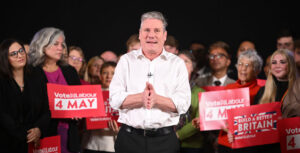It was around 2014 that I started to notice tracts warning about the dangers of populism from organisations with a close affiliation to New Labour. Over the decade since, little has changed: injected with the rocket fuel that was Brexit and Trump, it remains uncanny how many of those denouncing “populism” here in the UK have close links to Tony Blair. As for Blair himself, his new Institute for Global Change has a whole work-stream dedicated to confronting Populism, with one of its papers reflecting on “Populism in Power, 1990 to 2020”. Yet among its examples of populism of the period, there is a glaring omission: that led by Blair himself.
In 1993, the political consultant Philip Gould wrote a paper for internal Labour Party consumption advocating a “new populism”, based on the time he had just had working on the successful Democratic Party campaign for Bill Clinton. In his later book, The Unfinished Revolution (a bible for New Labourites), Gould said his memo went down “like a lead balloon” with the party machine. However, it proved influential with the young modernisers rising through the ranks, including Blair, Gordon Brown and Peter Mandelson. Gould went on to work on Blair’s leadership campaign the following year and then served as a pollster and trusted communications adviser in opposition and government. He died of cancer in 2011.
The day after Blair was selected as leader, Gould wrote another of his lengthy memos, its message eerily prescient as Starmer sets out his pitch to the Labour Party faithful today:
“I argued that the real political agenda was a combination of Right and Left. It was Right-wing on crime, welfare, immigration, discipline, tax and individualism, but Left-wing on the NHS, investment, social integration, opposition to privatisation and unemployment. People wanted change, but they didn’t yet want Labour… There is still a lurking fear about unions and the loony Left; there is potential concern about Labour because of its liberal social positions; there is anxiety about tax; there is almost no idea what Labour stands for.”
In 1999, after Blair’s first landslide, Gould wrote once more of this “new populism always seeking to hear the voices of those not often heard”. Crucially for him, this did not mean the unions and minorities, who Labour already paid a lot of attention to, but “working-class achievers and the middle class under pressure”. These were the people he had grown up around; he saw them as natural Labour voters who the party had repeatedly betrayed. “I came from the land that Labour forgot,” he wrote.
To get to these people, reassure them and to make them vote for you requires a lot of work: part of what Clinton referred to as the “head game” of politics. In his foreword to the revised edition of Gould’s book, Blair himself acknowledged this: “Politics is far more intellectual exercise than people ever think… You will always end up with a strategic definition of your overall political position. The question is therefore: do you impose it on yourself or do your opponents do it for you?”
What this revealed is that, for all its faults, New Labour understood how politics works — how people in the public eye are positioning themselves all the time, whether they realise it or not. And they decided it was better to do this deliberately. In this sense, theirs was not the intellectuality of the distanced, objective observer, who is committed to truth, but that of the participant who is in a fight and trying to win it.
This desire to understand where they stood with the public accorded a central role to Gould’s polling and focus groups, to the intense annoyance of many Labour MPs. Gould himself, perhaps somewhat naively, saw this market research “as an important part of the democratic process — part of a necessary dialogue between politicians and people, part of a new approach to politics”. He saw opinion polls and focus groups as a way for ordinary people to get their voices heard in the Labour Party and in government: a form of democratic idealism that contrasts starkly with New Labour’s reputation for cynicism and technocracy while in government, as well as with the distinctly anti-democratic tendencies of its supporters in more recent times.
In reality, however, this focus on responding to the public’s concerns was easily exploited in power, by giving one impression while doing the opposite: notably on immigration. This was particularly pertinent on immigration, where they made a lot of noise about restrictions while quietly opening up new avenues: something that subsequent Conservative governments have emulated. This feeds into a more general, jarring conflict between being attentive to moderate public opinion and New Labour’s sometimes maniacal focus on change and modernisation, on defeating the “forces of conservatism”, as Blair outlined in his conference speech of 1999. Given the stale Tory governments, stale Labour Party and stale country of the Nineties, the stars were aligned for the embrace of change. In fact, it seemed to fit so well that they effectively made it into a universal ideology: thereby departing in spirit from the natural conservatism that they had recognised in most people.
This tension in New Labour between respect for the electorate and the desire to overturn much of what the electorate holds dear appears in Gould’s book as a conflict between the ideas of the conservative philosopher Michael Oakeshott, whom he studied under at the London School of Economics, and the German idealist G.W.F. Hegel. Gould notes his debt to Oakeshott, but says that ultimately it was Hegel who prevailed in his mind for being “more satisfying, although more mystifying”.
Certainly, Hegel has much greater scope and ambition with his theory of dialectical progress and world-historical change. Because of this he has a much greater claim to authority, something we might see embodied in one of Blair’s favourite themes: “the world of change”, of inevitable and ever-increasing social complexity, technology and globalisation. This perspective is now standard in the upper reaches of public life, no doubt partly down to how it implies handing power to an expert class with a superior understanding of social change: a progressive elite. It confers a sheen of novelty and optimism onto the actions of power: of technocracy, quangofication and the ongoing project of using progressive identity politics to organise the state. It also serves as a neat means to exclude non-conformers from high society: for if you do not accept that certain changes are inevitable and cannot be reversed, then you count as someone without the requisite knowledge, as out-of-date and to be treated as a regressive outsider by the organs of power.
Here, the conflict within New Labour — and within Gould’s own mind — resolved itself in a way that would end up shutting out the people he had sought to represent. Hegel’s own promotion of the Prussian state as the apotheosis of the historical process finds itself replicated in the way New Labour followers tend to treat their own consensus as an endpoint: a culmination of social progress. In effect, they therefore reject Hegelianism as a continuing process of thesis, antithesis and synthesis. Instead, they treat the conflict of ideas as over and the game already won, notably on such things as mass immigration (which is to continue indefinitely). Any counter-currents can therefore be safely quarantined as “populism” and dealt with as threats to be managed rather than interesting challenges.
This transition among Blair and his followers from populism to anti-populism reflects the transition from being outsiders to insiders. Formerly, they saw themselves as an insurgent force. But now they are comfortable and indeed broadly set the tone for public life both in state institutions and the mainstream media.
And Keir Starmer’s Labour Party appears to follow cautiously in their wake. It is, for instance, notably wary of getting on the wrong side of public opinion on subjects such as crime and immigration, just as New Labour was. But it is also solidly committed to the consensus established in the New Labour years, of relying on arms-length, extra-governmental bodies staffed by fellow travellers to help push through policy choices under the guise of independent expertise. Rachel Reeves’s proposal to give the Office for Budget Responsibility (OBR) legal oversight over any major tax and spending decisions is a classic example. You are only going to do that if you know the body in question shares your instincts. Mark Carney’s very public endorsement for Reeves yesterday shows that the old guard of technocrats are pleased with Labour at the moment.
Today’s Labour Party, then, does not present itself as a populist insurgency against a tired Establishment as Blair and Brown did in the Nineties. Rather, it appears almost purely in a defensive role, its task being to reconsecrate the hegemony that New Labour initially established, restoring the equilibrium of the state and of Britain’s relations to the outside world. On the latter, Starmer’s Shadow Foreign Secretary David Lammy, one of the most vociferous opponents of Brexit, has promised a “Britain Reconnected” — effectively a restoration in foreign relations.
Where does this leave New Labour’s populist spirit? Gould wrote about the importance of “a new long-term radicalism, to ensure that progressive instincts become rooted in the institutions of the nation, just as conservative instincts were in the past”. And in this respect, his new populism clearly succeeded. However, in doing so it turned against its own democratic spirit, bypassing the people it was meant to serve. Rather than seeking to do what people want, centrists of the New Labour stripe generally seek to manage them away, imposing their own preferences and presenting them as the only sensible, reasonable approach.
In 1994, Gould advised Blair that “populism… means Labour becoming once again the instrument through which ordinary people believe they can achieve their aspirations”. It is inconceivable that Keir Starmer would embrace such an equation. Rather, his role is that of a safe pair of hands. Like many Tory leaders of yesteryear, he is trying to convey the impression that Labour will not disturb you under his rule.
But this looks unlikely. For, as Labour leader, Starmer is almost necessarily aligned to a failing, incapable technocratic state which orders itself using the same, broadly unpopular, progressive identity politics that Labour does. This all promises trouble ahead. Starmer himself is certainly not leading a populist uprising — but I think we can expect one to develop against his incoming government in pretty short order.
Disclaimer
Some of the posts we share are controversial and we do not necessarily agree with them in the whole extend. Sometimes we agree with the content or part of it but we do not agree with the narration or language. Nevertheless we find them somehow interesting, valuable and/or informative or we share them, because we strongly believe in freedom of speech, free press and journalism. We strongly encourage you to have a critical approach to all the content, do your own research and analysis to build your own opinion.
We would be glad to have your feedback.
Source: UnHerd Read the original article here: https://unherd.com/




